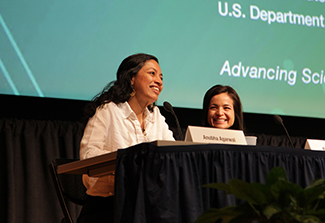Using polypills to transform heart failure care in South Asia
January/February 2024 | Volume 23 Number 1
By Mariah Felipe
 Fogarty International CenterDr. Anubha Agarwal (left) speaks during the Fogarty Global Health Fellows & Scholars 20th Anniversary event in April 2023 at NIH's Natcher Center. Dr. Roxanna Garcia (right) looks on.
Fogarty International CenterDr. Anubha Agarwal (left) speaks during the Fogarty Global Health Fellows & Scholars 20th Anniversary event in April 2023 at NIH's Natcher Center. Dr. Roxanna Garcia (right) looks on.
Dr. Anubha Agarwal began her research in India as a Fogarty Global Health Fellow during 2017–2018, co-mentored by Dr. Doriaraj Prabhakaran, executive director of the Centre for Chronic Disease Control (CCDC) in India, and Dr. Mark Huffman, professor of medicine and co-director of the Global Health Center at Washington University in St. Louis (WUSTL), Missouri.
During her Fogarty year, she developed, implemented, and evaluated, using an interrupted time series design, a heart failure quality improvement intervention including discharge checklists, audit-and-feedback mechanisms, and patient education among 1,400 patients hospitalized with heart failure in eight hospitals in Kerala, India.
Today, she is an assistant professor of medicine and co-director of the Global Cardiovascular Health program at WUSTL. Agarwal received a
Pathway to Independence award from the National Heart, Lung, and Blood Institute (NHLBI) in 2022, allowing her to build on her previous research to improve heart failure care in South Asia. She aims to substantially simplify heart failure management for patients with heart failure with reduced ejection fraction (HFrEF, the type of heart failure in which the left ventricle loses its ability to contract normally, and the heart can’t pump with enough force to push blood into circulation). Her goal is to shift the treatment paradigm from a multi-drug therapy to a polypill containing several guideline-directed medical therapies for HFrEF in one pill.
Her research still in its early phases, Agarwal and her team have already conducted in-depth interviews and focus group discussions with cardiologists, pharmacists, nurses, and patients throughout India aiming to understand the current context of heart failure care and acceptability, appropriateness, and feasibility of an HFrEF polypill implementation strategy. The next phase will be a multi-center type 1 hybrid randomized clinical trial among patients with HFrEF in South Asia. It will investigate whether an HFrEF polypill implementation strategy can improve key clinical outcomes compared to usual care. Through the development, implementation, and evaluation of HFrEF polypills, Agarwal hopes to improve heart failure care in South Asia and beyond.
 Photo courtesy of Northwestern UniversityPhoto of a busy street in Kerala, India, where Anubha Agarwal began her research on heart failure care in India while a Fogarty Global Health Scholar.
Photo courtesy of Northwestern UniversityPhoto of a busy street in Kerala, India, where Anubha Agarwal began her research on heart failure care in India while a Fogarty Global Health Scholar.
When asked about her motivation for this research, she states that she chose to pursue cardiology after her grandfather, who lived in India, died of a heart attack in his early 50s. She says, "It inspired me to become a cardiologist and, in many ways, inspires my continued commitment to improving cardiovascular care in India and South Asia." As a part of the Indian diaspora, having left India at only five years of age, she adds, "It’s been incredibly rewarding professionally and personally to be a part of a team generating evidence-based research to improve cardiovascular care in India."
Beyond her clinical and research pursuits, Agarwal embraces the role of a mentor, particularly for aspiring female researchers in cardiovascular medicine and global health science who are often underrepresented in both fields. "I have been so lucky to have been surrounded by fantastic feminist mentors who have always elevated me, and I'm trying to give that back.”
As she continues her work in India, as a part of the Indian diaspora, she wants to ensure there’s an equitable partnership that builds capacity with Indian researchers and institutions to ensure all voices are heard, "While we're helping to train the research workforce of India, we also need to acknowledge how much we have to learn from them."
More Information
Updated February 13, 2024
To view Adobe PDF files,
download current, free accessible plug-ins from Adobe's website.
Related Fogarty Programs
Related World Regions / Countries
Related Global Health Research Topics